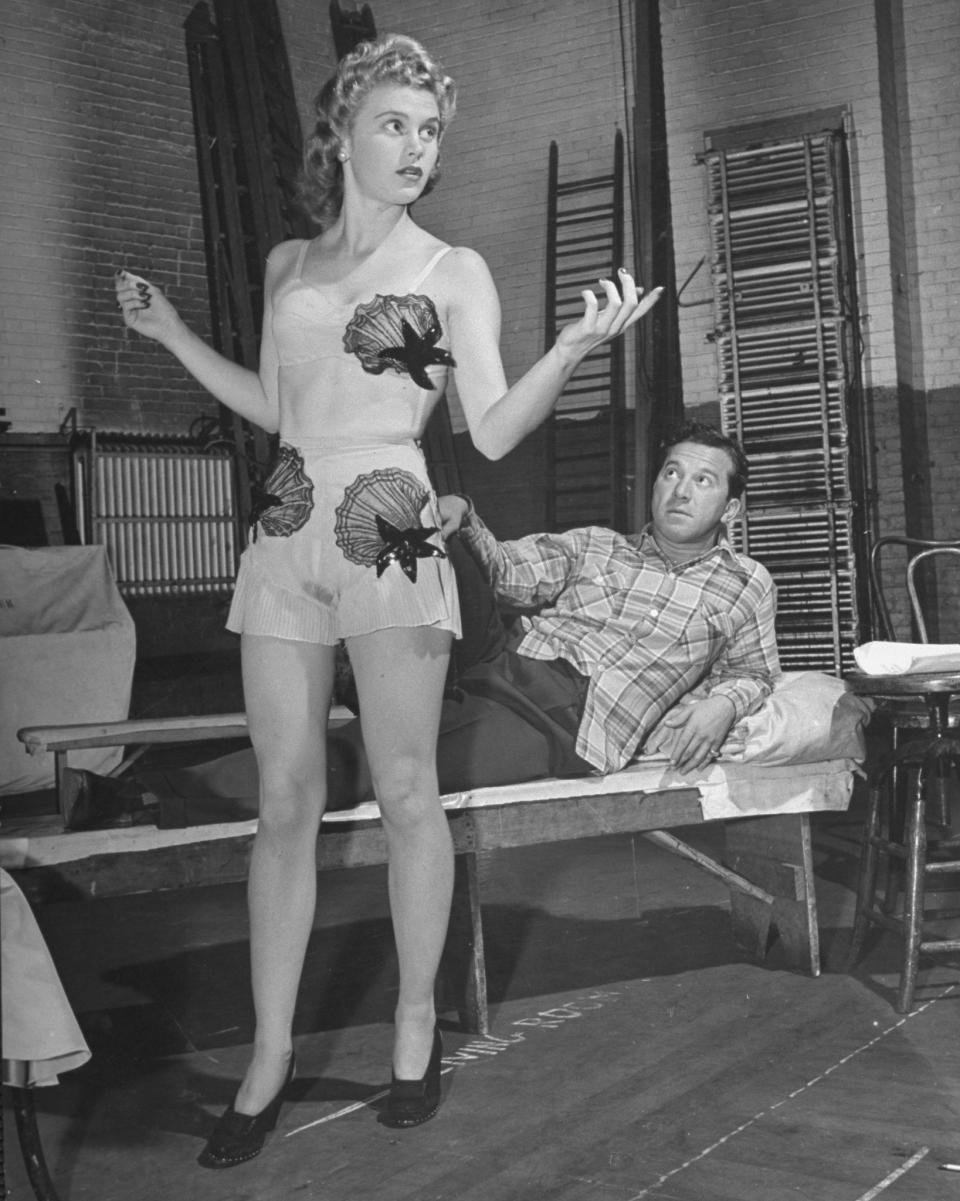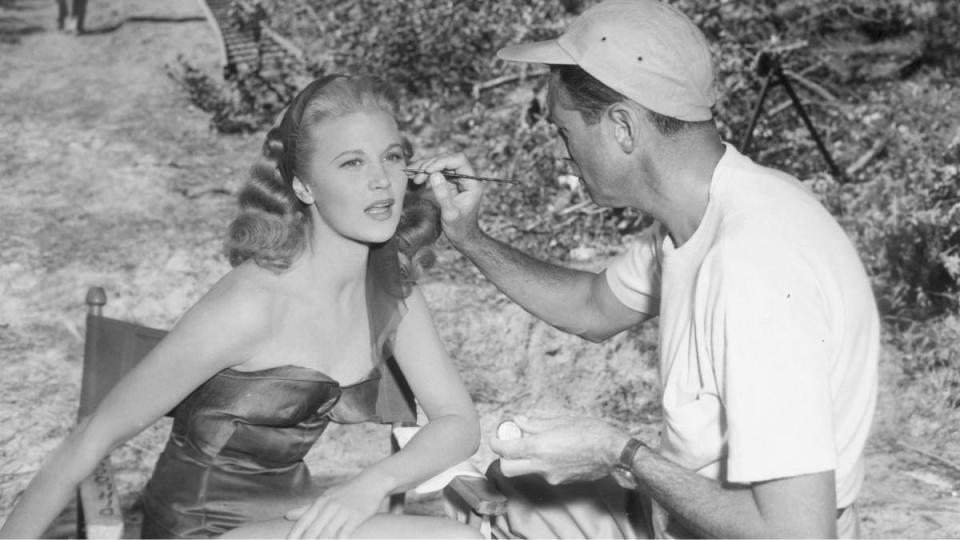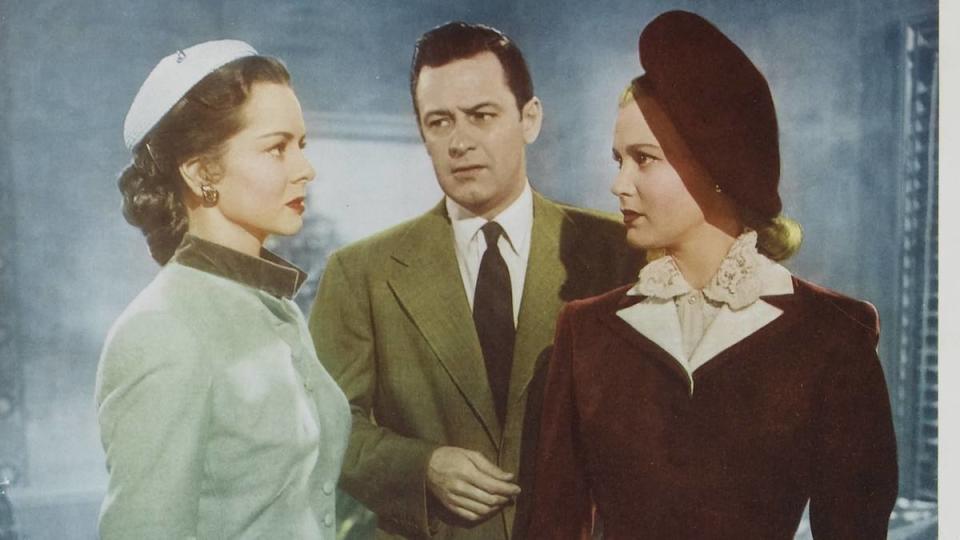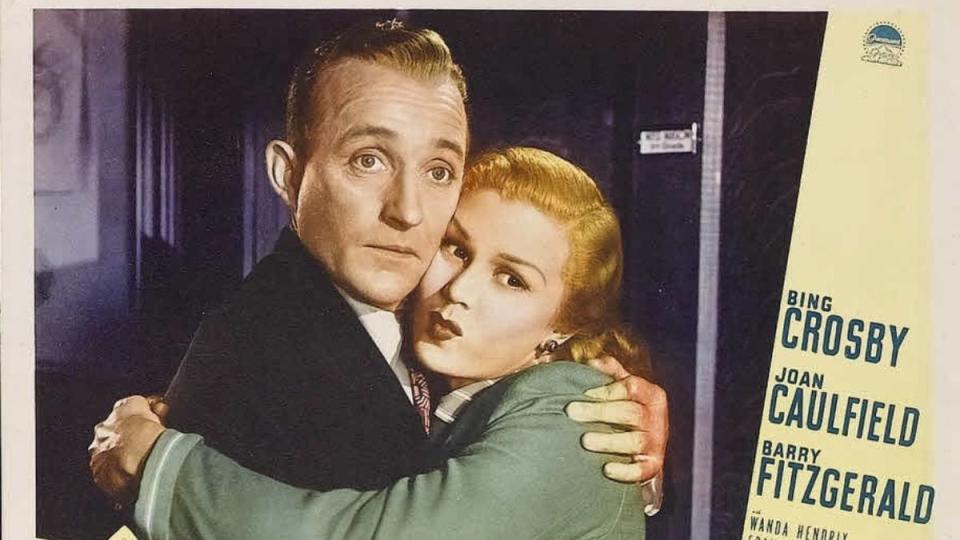Joan Caulfield Movies: 10 of the Charming Actress' Best Films
Growing up in New Jersey, Joan Caulfield always had dreams of being an actor and starring in movies, “since I’ve been a little girl,” she once revealed. “I remember that picture of Bette Davis’, Of Human Bondage. I can remember, I was a kid, and we’d go for a picnic or something, and I’d say, ‘Philip, when you kiss me I wipe my lips!’ And I was terrible,” she admitted, paraphrasing Davis’ famous line from that 1934 film.
Caulfield fears she wasn’t much better by the time she hit the stage as a Columbia University student. “My first review in the Columbia Spectator,” she recalled, “was that ‘Miss Caulfield spoke her lines as if they were machine made.’… I was so frightened. It was chaos.”
Her persistence paid off, though, and the burgeoning model — Caulfield appeared on the cover of Life magazine in 1942 — went on to shine in the role of Corliss Archer in 1943’s Kiss and Tell on Broadway, in which she played the role of a 16-year-old when she was in her early 20s.

George Karger / Getty
A film contract soon followed, and the Jersey native headed out west. “When I came to Hollywood, the head of production at Paramount Studios said I had nice legs so I was put in musicals,’ Caulfield once recalled, adding, “[But] I couldn't sing well enough to use my own voice. I had three or four voices — people must have thought I was a Maria Callas.’”

Silver Screen Collection / Contributor /Getty
Her time at that studio, she explained later in life, was full of ups and downs. When it was good, it was “wild and wonderful. It was like family. And Bing [Crosby] and Bob [Hope] sort of set the tone. We all played golf out in front of the dressing rooms.” Still, her work ethic and perfectionism nagged at her success, and as the New York Times noted, “she was determined to win a reputation as an actress and not, as she said, ‘just a decoration.’”

Hulton Archive / Stringer / Getty
Caulfield and her contemporaries, like Gail Russell and Diana Lynn, “were sort of golden girls, you see, and we didn’t know very much. Nobody trained us; though we were given anything we wanted like a new car or whatever,” Caulfield once shared. “We were around these super superstars, and it only corrupted us, because we’d think, ‘We want that, too, the bigger dressing rooms…all the trappings of stardom. We kept wanting more things instead of wanting to be marvelous actresses.”
She recalled that George Abbott, Kiss and Tell’s director-producer, had told her to stay on Broadway and study acting instead of running off to LA, “but I didn’t follow his advice. So I didn’t learn my profession until I’d been at Paramount for a while and met and studied with Michael Checkhov, the famous director and coach.”
To keep at her craft, she’d insist on breaks from Joan Caulfield movies during her Paramount contract to do theater work, and she also branched out into TV, appearing in My Favorite Husband from 1953 to 1955, which was based on Lucille Ball’s radio show that eventually became I Love Lucy. She also headlined her own 1957-58 series, Sally, inspiring TV stars of later generations with both her film and television work. “I always wanted to be [an actor] because I was a film addict: Joan Crawford, Bette Davis, Joan Caulfield, Joan Fontaine. I had a lot of sheroes,” The Jeffersons’ Marla Gibbs once noted.
Joan Caulfield movies boast some pretty impressive names (she was even rumored to have been the object of Bing Crosby’s affection), as well as lots of fun and dramatic moments. See for yourself in these 10 top selections.
10. The Lady Says No (1951)
Caulfield was described in a New York Times review of this film as “a nubile blonde as beautiful as the Monterey (Calif.) setting in which she lives.” She stars as the author of a popular book that warns women about the “dangers” of men. David Niven plays a good-looking magazine photographer who’s sent to do a feature on her — and you can probably guess where this romantic comedy is heading! Keep an eye out for Frances Bavier (The Andy Griffith Show’s Aunt Bee) in a supporting role.
9. The Petty Girl (1950)
In this musical romantic comedy that Caulfield did while on a loan to Columbia, she stars as Victoria Braymore, a mild-mannered but attractive professor who catches the eye of an artist (Robert Cummings) who wants her to pose for him. Time declared the film “an apocryphal account of how calendar artist George Petty awakened to his talent for drawing biologically improbably cheesecake.” Near the end of the film, Tippi Hedren makes her (uncredited) film debut.
8. Larceny (1948)
During a loan from Paramount to Universal, Caulfield starred in this film noir title as a wealthy widow who is at risk of having her money — and affections — stolen by Rick (John Payne), a con man. Shelley Winters co-stars as a mob moll who is secretly yearning for Rick.
7. The Sainted Sisters (1948)
Veronica Lake filled in for Betty Hutton here and co-stars with Caulfield in this comedy about two 1890s con women who steal thousands of dollars, then head to Maine to hide out. Despite their worst intentions, they end up being celebrated for helping out a charity, thusly drawing a lot of attention to both themselves and their sordid pasts. Co-star George Reeves would soon go on to play Superman.
6. Dear Wife (1949)

moviestillsdb.com/Paramount Pictures
In this comedy sequel to her hit Dear Ruth (see below), Caulfield reprises her role as Ruth, a woman caught between her husband Bill (William Holden) and father Harry (Edward Arnold) when the two men run for the same senate seat. The still burning affections of Ruth’s former-fiancé-turned-Harry’s-campaign-manager add to the insanity. “As sequels go, the new picture is most unusual, for it is every bit as enjoyable and racy as its progenitor,” the New York Times wrote at the time.
5. The Unsuspected (1947)
Famed director Michael Curtiz (Casablanca, Mildred Pierce) helmed this film, creating “some of the most unforgettable images of the film noir era” in this “pleasantly poisonous confection,” according to TCM. Its story follows Victor Grandison (Claude Rains), a radio mystery host, as he tries to make sense of a reported suicide at his mansion just as new details are surfacing about his wealthy young ward (Caulfield), who was believed to have drowned.
4. Monsieur Beaucaire (1946)
This historical comedy finds Caulfield starring as Mimi, a chambermaid love interest of the bumbling title character (Bob Hope), who is the barber to France’s King Louis XV. When Beaucaire is banished, it sets off a series of confounding political and romantic events. The New York Times said “Joan Caulfield is delightfully nimble” in her role, for which, according to the Hollywood Reporter, Paulette Goddard and Hedy Lamarr, had been considered.
3. Blue Skies (1946)
Caulfield plays a showgirl and nightclub singer who is pursued by two show business rivals played by Bing Crosby and Fred Astaire in this perky musical romance, which received two Oscar nominations for its score. “With Crosby, Astaire and Joan Caulfield on the marquee, a wealth of Irving Berlin songs and lush Technicolor production values, this filmusical can't miss,” Variety raved at the time. Crosby and Caulfield, who reportedly had an affair, appeared on the cover of the Oct. 7, 1946, issue of Life in support of the film. “He used to sing songs to me every week on the Kraft Music Hall,” Caulfield recalled later in her life about the actor. As Caulfield’s close friend Patricia Neal wrote in her 1988 memoir, “She, too, was in love with an older married man who was quite as famous as Gary [Cooper]. She confided to me that she desperately wanted to marry Bing Crosby. We were in the same boat in more ways than one, but I could not tell her so.”
2. Welcome Stranger (1947)

moviestillsdb.com/Paramount Pictures
Bing Crosby partnered again with Caulfield in this romantic comedy, in which the actor plays Jim Pearson, a young California doctor, who’s called to small-town Maine to fill in for an older doctor (Barry Fitzgerald) headed for a long overdue vacation. Caulfield plays the local schoolteacher that catches Pearson’s eye and makes his trek worthwhile. Welcome Stranger proved to be a hit, becoming the highest grossing film at the U.S. box office in 1947.
1. Dear Ruth (1947)
TV Guide calls this film version of the 1944 play by Norman Krasna “good fun.” It stars Caulfield as Ruth, an engaged woman who’s surprised to learn her younger sister has been posing as her to correspond with an overseas soldier (William Holden). When the Lieutenant — who’s home on a two-day leave — shows up to declare his love, Ruth figures she can go along with it for just 48 hours to spare his feelings … but then her heart starts to question everything.
For more Classic content, keep reading...
‘It’s a Wonderful Life’: Little-Known Facts About the Holiday Classic
‘The Little Rascals’ Original Cast: What Happened to the Beloved Ragtag Crew?
